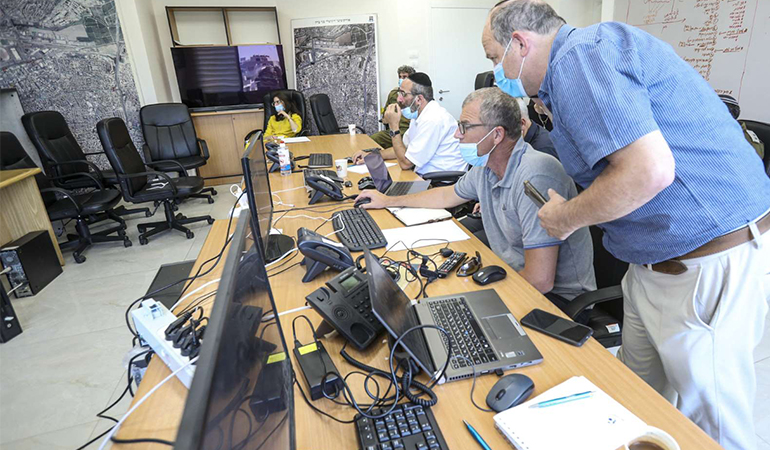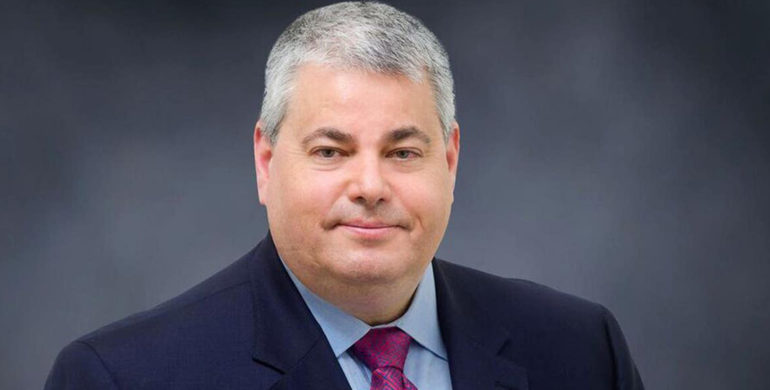Four years ago, former ISA member Yaron Ashkenazi founded the Canadian AWZ Ventures fund, which has so far invested in 17 Israeli companies. ■ Today, it is raising a third fund ■ “Technology in Israel is ten years ahead of the rest” | Published on TheMarker 29.11.20
In September, the cyber company ” Pcysys” announced a large capital raising of $ 25 million. The company deals with automated intrusion tests for the organization, a kind of robot hacker for rent. The round was led by the giant New York fund Insight, but alongside it, another small fund, Awz Ventures, participated in the round, which is a specialized and rather unusual fund in the Israeli landscape.
“We are not just cyber,” explains from the beginning Yaron Ashkenazi, the founding partner of Awz Ventures, an extraordinary Canadian venture capital fund that specializes in investing in the field known as Homeland Security. “The term refers to three things: cyber, intelligence, and physical security, all with a heart of artificial intelligence,” explains Ashkenazi. “To bring any organization to a superior level of security one needs to merge these three capabilities, and to allow them to converse with each other to achieve high efficiency.”

© Provided by TheMarker – The Homeland Security field has experienced accelerated growth since the terrorist attacks on the World Trade Towers in 2001 Photo: AP
The start-up Octopus Systems that Awz Ventures is investing in
Ashkenazi demonstrates the concept through an Israeli portfolio company called Octopus:
OCTOPUS- “This is an example of a company that has been doing exactly that for more than seven years: it is a unified platform where all sensors in the city or organization can be connected and the system can make real-time conclusions regarding threats, based on predefined protocols but also by using artificial intelligence”.
“This is a platform that can merge other capabilities that we have in our groups, such as face recognition, or cyber solutions. The Octopus platform is used by the security and intelligence agencies in Israel, in the control center of Leumi Bank, ICL, Coca-Cola, and other industrial companies. During the Covid-19 crisis, the Homefront Command and the Municipality of Bnei Brak used the system to manage the lockdown.”
Octopus monitors entrance gates, information from cameras, and fuses this data with diverse intelligence information sources, even rocket alerts. Octopus also has a mobile app for the emergency response team that allows the control center to manage the field forces, and these forces can send back reports to the control center from the field.
Another example that illustrates the funds interest is Neural Guard: “The company developed a machine learning system that assists the human inspector that checks the baggage at the X-ray scanners in the airports. The company achieves an identification level of more than 90% compared to 30% of the human operator”, says Ashkenazi.
“No offensive cyber”
Competing for the title of the most interesting company in the fund’s portfolio is Ultra Global. This is an open-source intelligence company, which was founded in 2016 and has already raised tens of millions of dollars – but so far has remained under the radar. Just recently, Ultra Global launched a website.
The start-up Ultra Global that Awz Ventures is investing in
Ashkenazi refuses to elaborate on the company, but from their website, we can learn that “the company provides real-time insights on every person, company, or event. Ashkenazi only agrees to say that Ultra is not considered an offensive cyber company: “We are very careful in choosing technologies that are solely defensive”, he says.
Another characteristic of all members of the Awz fund – and this is a condition for support from the fund – is that the company will also have civil capabilities: “If the company’s product has no civil use, we will not invest in it. We are looking for solutions that are of dual use (dual, security, and civil use). We also know how to take companies from the security field and ‘civilize’ them. For example, a company like Neural Guard, its product can of course find a weapon concealed in a suitcase but it is also suitable for customs authorities. Ultra can be used by intelligence agencies but also by financial institutions in the customer screening process”.
All investments in Israel
Awz Ventures was established in 2016. It is defined as Canadian, where most of its activities and most of the functionaries are, but all investments are in Israel. By the way, the investment funds name is pronounced as the word “Oz” – which does not always work with Americans and Canadians. “Sometimes it works,” laughs Ashkenazi. He divides his time between the two countries: two weeks in Canada and two weeks in Israel.
Awz initially raised a relatively small first fund of $ 30 million. In 2018, a second fund was raised. “We set it at $ 50 million, but in the end, we closed $ 75 million,” says Ashkenazi. Now Awz is raising a third fund: “A month ago we kicked off our growth fund you with a target of $ 250 million. We closed $ 25 million within three weeks. The third fund will allow us to invest in the second and third rounds, and to be a multi Stage fund (investing in all company stages). The third fund is already making investments. The fund’s portfolio has a total of 17 companies.
The establishment of the Awz Foundation is related to the course of Ashkenazi’s life. “After serving in the army with the paratroopers, I was drafted into the ISA for the personal security unit. “I worked over the years with the prime ministers, Yitzhak Shamir, Shimon Peres, and especially with Yitzhak Rabin – for almost seven years,” recalls Ashkenazi. After that I went to study in the UK, I graduated with a law degree, and at the same time I was involved in government security projects in Europe.”
“After that, I was in the high-tech industry for a few years and was recruited to establish the Friends of Yad Vashem Association in Israel – a position I led for 20 years: ten years in Israel and ten years in Canada. When I finished this position I decided that I want to combine several things together: Zionism and my love for Israel, Entrepreneurship, and Hi-tech, and connection to a large business community in the United States and Canada that sees Israel as a start-up nation”.
Does this also apply to Homeland Security?
“Definitely. I can invest anywhere in the world, but every time we assess an investment, we find that the entrepreneurial DNA in Israel and the technology that is here, are just ten steps ahead.”

© Provided by TheMarker- Octopus Systems is used in the Covid-19 Control Center in Bnei Brak Photo: Ofer Vaknin
According to Ashkenazi, the funds location, Canada, creates a gateway to the United States. “We arranged a road show for Pcysys in Canada. They introduced the technology to ten companies and with all of them it signed commercial agreements. These achievements also opened up the American market more easily for her”.
The Awz Foundation is made up of several heavy names. One of the partners is Stephen Harper, who served as Prime Minister of Canada from 2006-2015. It also includes a number of senior executives from Canadian and Israeli intelligence and security agencies, including CSIS (the Canadian equivalent of the CIA) and the Canadian Army. One of the directors in the fund is Erez Kreiner, who established the cyber division of the GSS and one of its advisers is Haim Tomer, who was the head of “Tevel” at the Mossad – the division at the institution that is in charge of intelligence and diplomatic relations.
“There is no sporadic choice of companies,” Ashkenazi claims. “We have an orderly process. We sit down with our special team of consultants, and they point out gaps and needs in the world of homeland security and in private bodies. We do a scan of the professional team of all the solutions in the world. “Thanks to our consultants’ network of contacts, we are often exposed to technologies when no one else has been exposed to them.”
A growing field
Homeland Security has been a growing field for the past 20 years, especially since the 2001 attack on the Twin Towers. According to the research firm Market and Markets, the industry recorded revenue of $ 590 billion in 2019 and is expected to grow to $ 830 billion in 2025.
According to the Israel Export Institute, there are about 500 companies in the field in Israel, but Awz competes in the narrow field of companies that also provide civil use. In this sense, it competes to some extent with the RDC Fund, which is a joint fund for Rafael and Elron that deals with the civil transfer of military technologies. The arms giant Elbit operates the “Incubit” incubator, which also deals with dual-use technologies.
How has the corona affected you?
“At the end of February we set up an emergency cabinet within our team, and we started speaking with each company, and with all of them together. The recommendations were on three levels: first, we ensured the survival of the companies 18-24 months ahead in terms of financial strength. Second, we encouraged the companies to connect to any organization which can give them a grant, such as The Innovation Authority in Israel and Horizon 2020 in Europe. We also transferred the companies to a process of remote installations”.
The fund plans to open offices for business development in London and the United Arab Emirates “in order to help our portfolio companies in assimilating into these markets and selling to European and Persian Gulf countries” Ashkenazi concludes.


